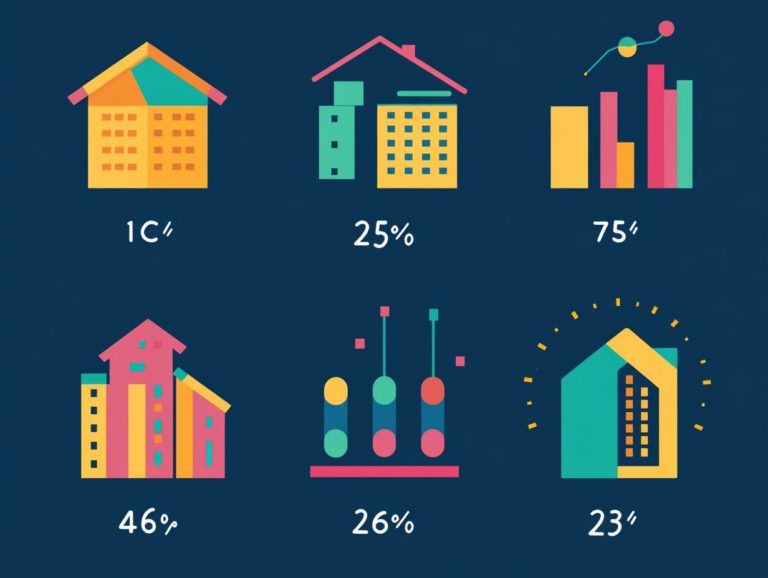5 Tips for Evaluating Property Values
When you find yourself navigating the world of buying or selling property, grasping its true value is essential.
A multitude of factors plays a pivotal role in determining property values. These include the prime location, comparable homes nearby, prevailing market trends, and the condition of the property itself.
Get ready! Here are five essential tips that will empower you to assess property values like a pro. This guide delves into common pitfalls, effective negotiation strategies, and the long-term ramifications of overpaying.
Whether you re embarking on your first purchase or are a seasoned investor, this information will equip you with the insights needed to make smart decisions in the real estate market.
Contents
- Key Takeaways:
- 1. Location, Location, Location
- 2. Comparable Properties in the Area
- 3. Market Trends and Economic Factors
- 4. Property Condition and Potential for Improvements
- 5. Local Amenities and Services
- What Factors Affect Property Values?
- What Are the Different Methods for Evaluating Property Values?
- How Can You Determine If a Property Is Overpriced?
- What Are Common Mistakes to Avoid When Evaluating Property Values?
- How Can You Negotiate for a Fair Price Based on Your Evaluation?
- What Are the Long-Term Effects of Overpaying for a Property?
- Frequently Asked Questions
- What Are the Top 5 Tips for Evaluating Property Values?
- How Does Location Affect Property Values?
- What Role Do Market Trends Play in Evaluating Property Values?
- Why Is Property Condition Important in Determining Value?
- What Is the Significance of Comparable Properties?
- How Does Future Development Impact Property Values?
Key Takeaways:
- Location is a key factor in property value, so research the area carefully.
- Compare similar properties in the area to determine a fair market price for the property.
- Consider market trends and economic factors that may affect the property’s value.
1. Location, Location, Location
In the world of real estate, the phrase “location, location, location” truly reigns supreme. The geographic area of a property has a strong effect on its market value and appeal to investors, buyers, and tenants.
This factor is crucial in property valuation and investment strategy. When properties are in prime locations, they often enjoy the perks of being close to essential amenities like schools, shopping centers, and public transportation.
This proximity not only enhances their attractiveness but also drives up demand. For example, a home just a stroll away from a vibrant downtown typically commands a higher price than one tucked away in a less convenient area.
The quality of the neighborhood is equally significant; safe and visually appealing communities fetch better resale values. Market conditions can fluctuate based on local economic factors. Employment rates and upcoming developments can dramatically shift property values.
Don t miss out on successful investment properties like luxury condos by the coast or single-family homes in emerging urban neighborhoods. These examples illustrate how advantageous locations can lead to impressive returns.
This emphasis on location is mirrored by mortgage lenders and appraisers, who consistently prioritize location assessments as a key element of their evaluations.
2. Comparable Properties in the Area
When you analyze comparable properties in the area, you unlock the key to accurate property valuation. This approach provides you with valuable insights into market trends, enabling you to determine a fair transaction price through a method that appraisers use to compare similar homes to set a price.
To effectively pinpoint comparable properties, appraisers look at those that share similar physical attributes, such as size, architectural style, and the number of bedrooms and bathrooms. Location also significantly impacts desirability and potential market value.
Recent sales data is your best friend here, offering a real-time glimpse into the market and revealing how much buyers are willing to invest in similar homes. By weaving these elements together, appraisers can arrive at a more precise market value, ensuring that their assessments reflect both the unique characteristics of the property in question and the prevailing economic conditions.
3. Market Trends and Economic Factors
Understanding market trends and economic factors is crucial for making informed decisions in real estate. These elements directly impact property valuation, investment opportunities, and overall market health, influencing both buyers and sellers alike.
For instance, consider how fluctuations in interest rates can either entice or dissuade potential buyers. When rates dip, demand typically surges as borrowing becomes more accessible.
Similarly, employment rates act as a vital barometer for economic health. A robust job market often leads to increased consumer confidence, which can significantly boost rental demand.
Local government policies, including zoning laws and tax incentives, can also exert considerable influence on the viability of investment properties.
For example, neighborhoods experiencing revitalization due to local improvements may witness a surge in property values, attracting savvy investors seeking promising returns.
4. Property Condition and Potential for Improvements
The condition of your property is crucial to its market value and allure. Well-maintained properties naturally draw in higher offers. In contrast, those requiring significant renovations might face added repair costs and renovation expenses that could scare off potential buyers.
Conducting thorough inspections is essential for evaluating your property’s current state. This allows you to pinpoint critical areas that need attention. With effective property management strategies in place, you can prioritize maintenance tasks that not only preserve but also enhance your property s value over time.
Well-planned renovations like upgrading kitchen fixtures or improving curb appeal can make a significant difference in value appreciation. Strategic improvements aim to attract potential buyers’ preferences and ensure you capitalize on your investment, positioning your property favorably in an increasingly competitive market.
5. Local Amenities and Services
Local amenities and services play a vital role in determining property value. Access to essential facilities like schools, parks, and shopping centers enhances a property’s desirability and influences the dynamics between buyers and sellers in the real estate market.
In today s competitive landscape, prioritize properties near amenities such as public transport, recreational areas, and quality healthcare facilities. These features attract potential tenants and justify higher rental rates.
Consider a property nestled within a reputable school district it can easily draw families eager to pay a premium for convenience. Neighborhoods with vibrant dining and entertainment options create a desirable lifestyle, further boosting your rental income potential.
Understanding local amenities can unlock smarter buying choices for your investment strategy, leading to stronger returns in the long run.
What Factors Affect Property Values?
Numerous factors shape property values in the real estate arena, including market conditions, economic obsolescence, depreciation, and ownership rights. Each of these elements plays a vital role in how real estate is appraised and perceived in the competitive landscape of property investment and management.
Market conditions, driven by the dynamics of supply and demand, have a direct impact on prices. For example, when a wave of buyers floods desirable neighborhoods, costs can soar. Conversely, economic obsolescence like changes in local employment rates or infrastructure challenges can significantly diminish a property’s appeal, leading to depreciation.
Depreciation is not solely based on the age of a property; it can also arise from external factors such as zoning changes or a decline in the neighborhood. Ownership rights add another layer of complexity; properties with clear titles typically command higher values than those with ambiguous ownership, influencing investors’ willingness to pay a premium.
Grasping these interconnected elements is essential for making informed investment decisions.
What Are the Different Methods for Evaluating Property Values?
Evaluating property values can be accomplished through several appraisal methods, each offering unique insights into a property’s market value and investment potential. These approaches include the sales comparison method, the cost approach, and the income approach.
The sales comparison approach analyzes similar properties that have recently sold, making it particularly effective in vibrant real estate markets. In contrast, the cost approach estimates the replacement cost of a property, ideal for new constructions or unique properties that lack comparable sales.
Meanwhile, the income approach excels with investment properties, placing significant emphasis on net operating income (NOI) the money a property makes after expenses and the gross rent multiplier (GRM), which makes it easy to look at properties, especially in rental markets.
By understanding the nuances of each method, you can select the most suitable approach tailored to specific scenarios, optimizing your investment strategies.
How Can You Determine If a Property Is Overpriced?
Determining if a property is overpriced requires a careful analysis of the transaction price compared to similar sales. This involves thorough market research to ensure informed decisions based on factual data rather than emotional impulses.
Start your analysis by reviewing appraisal reports. Pay close attention to important metrics like square footage, age, and the property’s condition.
Dive into market data, especially trends in your local area, to understand fluctuations in property values.
By examining similar homes that have recently sold in comparable neighborhoods, you will gain valuable insights into fair pricing.
It’s crucial to understand current market conditions, whether it s a buyer’s or seller’s market. This comprehensive approach helps you identify overpriced properties and equips you with smarter negotiation tactics for successful investments.
What Are Common Mistakes to Avoid When Evaluating Property Values?
When evaluating property values, you might fall into common traps that lead to misguided assessments. Overlooking local market changes or neglecting the property’s condition can skew perceptions and impact returns.
For example, market trends provide essential insights into the area’s economic landscape and potential appreciation. The property s condition may reveal issues that could require costly repairs.
Similar homes that have sold recently, also known as “comps,” are critical for establishing realistic valuations. They reflect what buyers are currently willing to pay.
To avoid these pitfalls, conduct thorough research and consider all relevant factors. This careful approach enhances your decision-making and strengthens your investment strategy.
How Can You Negotiate for a Fair Price Based on Your Evaluation?
Negotiating a fair price based on your property evaluation requires a strategic approach. This combines factual data, analysis of similar homes, and an understanding of the seller’s motivations.
To achieve this, present your evaluation findings effectively. Highlight key data points that underscore the property’s true value and potential.
For instance, sharing recent sales of similar homes or local market trends enhances your credibility during negotiations. This informed approach fosters trust and creates a win-win scenario for both parties.
What Are the Long-Term Effects of Overpaying for a Property?
Overpaying for a property can lead to serious long-term issues, including negative cash flow and diminished owners’ equity. This impacts your financial performance.
When investors fail to gauge a property’s true market value, they may find themselves in a cycle of financial pressure. This can elevate stress levels while trying to meet mortgage payments, worrying about stagnant or declining property values.
Neglecting a thorough valuation during the purchasing process can hinder future investment decisions. Therefore, conducting careful evaluations before acquiring property is essential for protecting your financial well-being and maximizing long-term potential.
Frequently Asked Questions
What Are the Top 5 Tips for Evaluating Property Values?
The top 5 tips for home appraisal success include evaluating location, market trends, property condition, similar homes that have sold recently, and potential for future development.
How Does Location Affect Property Values?
Location is crucial in determining property value. A home in a safe, appealing neighborhood with good schools and amenities tends to have a higher value.
What Role Do Market Trends Play in Evaluating Property Values?
Market trends, including supply and demand, interest rates, and the local economy, affect property values significantly. Researching current trends is essential for accurate evaluations.
Why Is Property Condition Important in Determining Value?
The condition of a property directly impacts its value. A well-kept home with modern features usually commands a higher price than one needing repairs.
What Is the Significance of Comparable Properties?
Looking at similar properties nearby helps determine value accurately. Focus on homes that match in size, location, and condition.
How Does Future Development Impact Property Values?
Future development potential, like new infrastructure, significantly influences property values. Homes in growing areas often appreciate faster than those in stagnant neighborhoods.






